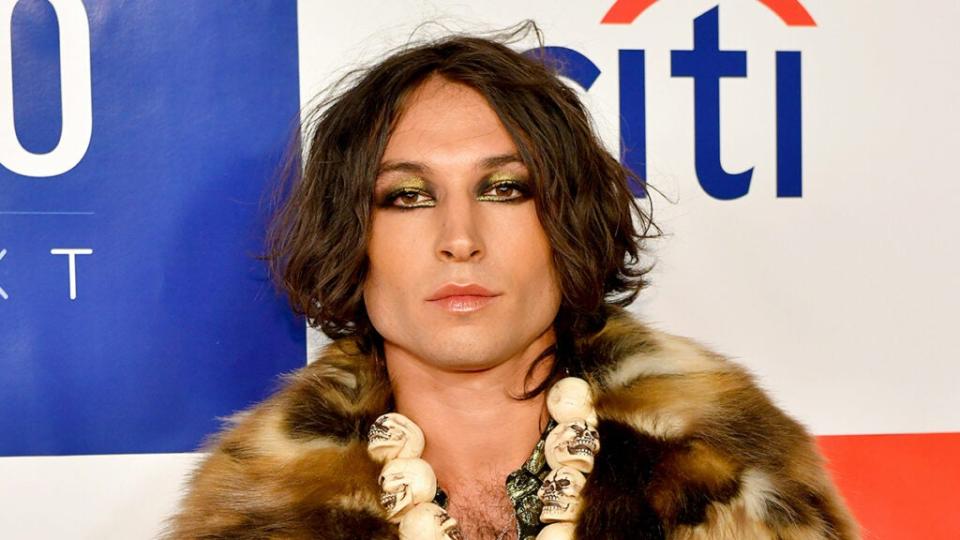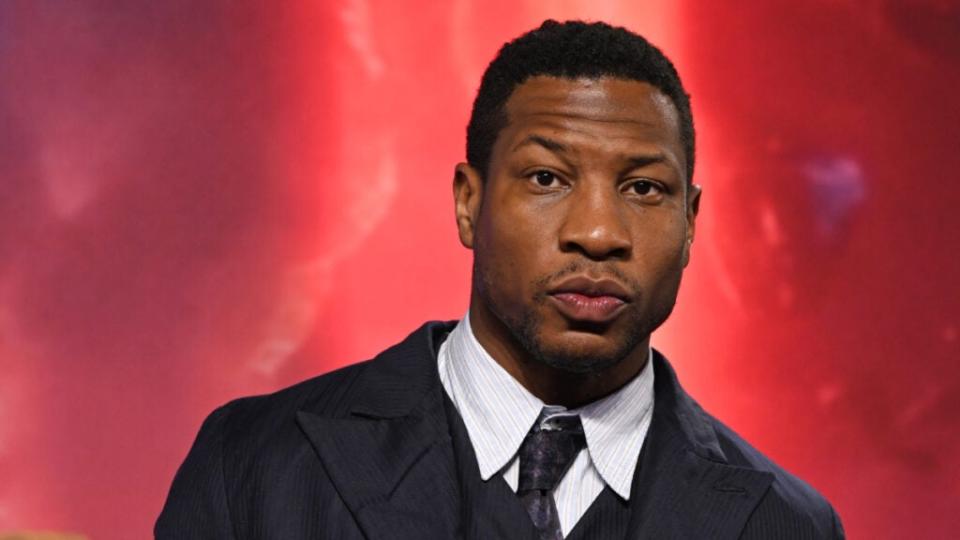Jonathan Majors, Ezra Miller and What’s a Studio to Do When Misconduct Charges Flare
- Oops!Something went wrong.Please try again later.
Jonathan Majors will be back in court Thursday, defending himself against charges of domestic violence. It’s not just the actor’s own reputation at stake: Disney placed a big bet on Majors by making him a key figure in future Marvel movies — the “Big Bad” of Phase 5 as the supervillain Kang the Conqueror (and his many variants).
His case, along with the public troubles of “The Flash” star Ezra Miller, has taken on fresh prominence in Hollywood as studios struggle with the performance of costly franchise films at the box office. An investment of $200 million or $300 million into a franchise starter or sequel is risky enough, but add in the fact that this summer may only result in a single billion-dollar-grosser (“Barbie”) as sequels underperform, and an actor’s off-set behavior and reputation becomes even more of a concern for any Hollywood studio.
“As an actor, as somebody that’s looking to sign into a franchise, there has to be an understanding of their role and the responsibility that they’re playing,” said Samantha Flynn, principal and chief strategy officer at Junipr Public Relations.
For studios, “if you align yourself to an actor’s brand, then you have to look at the whole brand. And you have to know that you are creating ties that are hard to break,” said David Oates, president of the crisis PR firm PR Security Service.
These latest challenges, and even the question raised by Oscar-winning actor Kevin Spacey’s acquittal in London of sexual assault charges, raise the question of how studios need to approach these actors’ presence in multiple movies, with contracts that often compel actors to plan a decade of their life around a franchise’s production.
Can studios expect key cast members to remain clean of misconduct that whole time?
Disposing of actors who run into trouble isn’t as simple as exercising the morality clauses long present in Hollywood contracts. The increased scrutiny on public figures and rising volume of dialogue on social media have complicated the calculus around when to wait out a frenzy and when to make a business decision to cut someone loose.
The damage can be considerable: When Warner Bros.’ big-budget comic book movie “The Flash” passed the $100 million dollar mark at the box office on July 5, it wasn’t a cause for celebration. The feature, boasting a production budget of $200 million before factoring in promotion and advertising, is already considered a significant flop for the studio.
It’s not clear how much of a factor Miller’s reputational woes — a slew of charges of violent outbursts and illicit sexual behavior — impacted the film’s performance. But an overarching issue, and one routinely mentioned on social media, was how the studio’s commitment to keeping the star in place turned off some audience members.

Miller, who uses they/them pronouns, began running into trouble in April 2020 when a video surfaced in which they appeared to choke a woman in a bar in Iceland. In June 2022, Miller was accused of grooming Tokata Iron Eyes, a Lakota activist, starting at the age of 12. In August of that year, Miller was charged with burglarizing a Vermont home, although the charge was dropped after Miller pleaded guilty to trespassing instead. A Rolling Stone article reported Miller lived on a farm with a 25-year-old woman and her children in unsafe conditions. In a statement provided by Miller’s attorney’s on their behalf, Miller contends that the allegations against them were false with the restraining order lifted in June of this year.
An individual close to Miller told TheWrap that the actor had undergone intensive therapy and has spent the last year living quietly while acknowledging their mental health issues.
Miller said in a prepared statement last August that “Having recently gone through a time of intense crisis, I now understand that I am suffering complex mental health issues and have begun ongoing treatment. I want to apologize to everyone that I have alarmed and upset with my past behavior. I am committed to doing the necessary work to get back to a healthy, safe and productive stage in my life.” All of the charges against him have been resolved and adjudicated with the actor facing nothing criminal at this time.
Warner Bros. stood by the performer, with “Flash” director Andy Muschietti saying that any discussion of sequels would include Miller. The actor conducted no interviews to promote “The Flash” and Miller was kept away from press during the film’s rollout save for a single red carpet appearance, an unusual move for a franchise film.
“Warner Bros. is like, ‘Well, Miller is what it is. Yeah, he’s been in trouble but we got a movie and he’s not a bad guy on the set,'” said Oates. “I think they regret it.”
Warner Bros. declined TheWrap’s request for comment.
Nine months ago, the studio announced that new DC co-head James Gunn would rebuild the superhero universe, which could mean replacing current actors. Flynn said Gunn’s overhaul would be an easy way to drop Miller from future projects while minimizing blowback.
The Majors problem
Like Miller, Majors was supposed to be the new face of a major superhero franchise. In his case, that was the next phase of the Marvel Cinematic Universe, with his character Kang having a prominent role in both the second season of the Disney+ series “Loki” as well as “Ant-Man and the Wasp: Quantumania.”
But when the actor was faced with charges of domestic violence and a damning expose in Rolling Stone, many wondered if the studio would be quick to distance themselves from him. (Majors has maintained his innocence.)
Disney is in an easier position than Warner Bros., since the allegations against the actor came out after “Quantumania” had already opened in theaters (it, too, underperformed at the box office) and the Majors-starring “Avengers: The Kang Dynasty” isn’t set for release until 2026. That means the studio doesn’t have to weigh in on Majors’ predicament or make hard decisions right now, experts said.
“Majors’ next Disney-driven projects won’t be released until long after this current news cycle has subsided,” said Pilaar Terry, managing partner and COO of POV Agency.
Majors does appear on the upcoming second season of the Marvel Disney+ series “Loki,” which he shot prior to his altercation. It’s unclear if his role has been reduced in post-production, or how prominently he appears in the completed version of the series that debuts in October.

Disney is “playing it much smarter with this wait-and-see approach,” said Flynn. “He’s not in any specific films, but I guarantee that they’re going to evaluate and let that course come out before they make any decisions on if they’re going to move forward with the film.”
And there’s always some comic-book magic Marvel can pull. The MCU already has a baked-in way to replace Majors if the studio wants to.
“Jonathan Majors’ character is a variant, right? So they can replace him very quickly and just say, ‘Oh, he’s changed from a different multiverse,'” Flynn said. “But the fact that they’re really taking their time and letting the core case play out, I think is actually smart.”
Even without the variant excuse, Marvel has replaced actors before with no negative reaction from fans. Don Cheadle replaced Terrence Howard after the first “Iron Man” and Harrison Ford is filling the shoes of the late William Hurt in the upcoming film “Thunderbolts.”
The perils of perfection
Studios that choose to cut ties with an actor may still face criticism.
And with public sentiment weighing heavily nowadays, coupled with a rising Gen Z audience that cares about the authenticity of the people they give their money to, studios might have to focus on the reputation of stars before they sign them. (It’s not clear, though, if Warner Bros. or Disney would have unearthed signs of trouble before the allegations against Miller and Majors emerged.)
“Everybody has to do their due diligence when they’re signing,” said Flynn. “And it’s not just always about the acting talent or the schedule availability. It’s the reputation.”
One way to accomplish this contractually is to link someone’s ability to be insured on set to keeping a spotless reputation.
If box office returns reflect antipathy towards a star, studios might have a business case for strict enforcement. They could also wait until audiences are in a forgiving mood. Majors and Disney might well have time on their side.
“History has shown us that if Majors is a good steward of the brand and focuses on positive behavior then he can reestablish his reputational capital with distanced audiences,” Terry said.
Some even doubt Majors’ troubles will touch Disney.
“Majors will have no effect on the Disney brand,” said an agent who asked not to be named. “He will, however, likely have ruined his personal brand and certainly his career momentum.”
The challenge of consistency
The lack of consistent enforcement makes Hollywood morality clauses largely performative, according to Oates. Each production crafts its own rules, so what one producer puts in place doesn’t always happen with another. Performers with a history of bad on-set behavior can just move to the next production with little pushback.
That could change if Disney decides to replace Majors. Representatives for Disney and Majors didn’t respond to TheWrap’s requests for comment on his future with the studio.
Disney “has long set industry standards,” said Terry. “Disney is a heritage brand adept at overcoming challenges and crises.”
The main challenge for any studio, said Terry, is “the consistency required for ongoing reputation management.”
That’s because Majors and Miller aren’t the first stars to run into trouble in a way that damages their careers and the affections of audiences. And they won’t be the last.
The post Jonathan Majors, Ezra Miller and What’s a Studio to Do When Misconduct Charges Flare appeared first on TheWrap.

